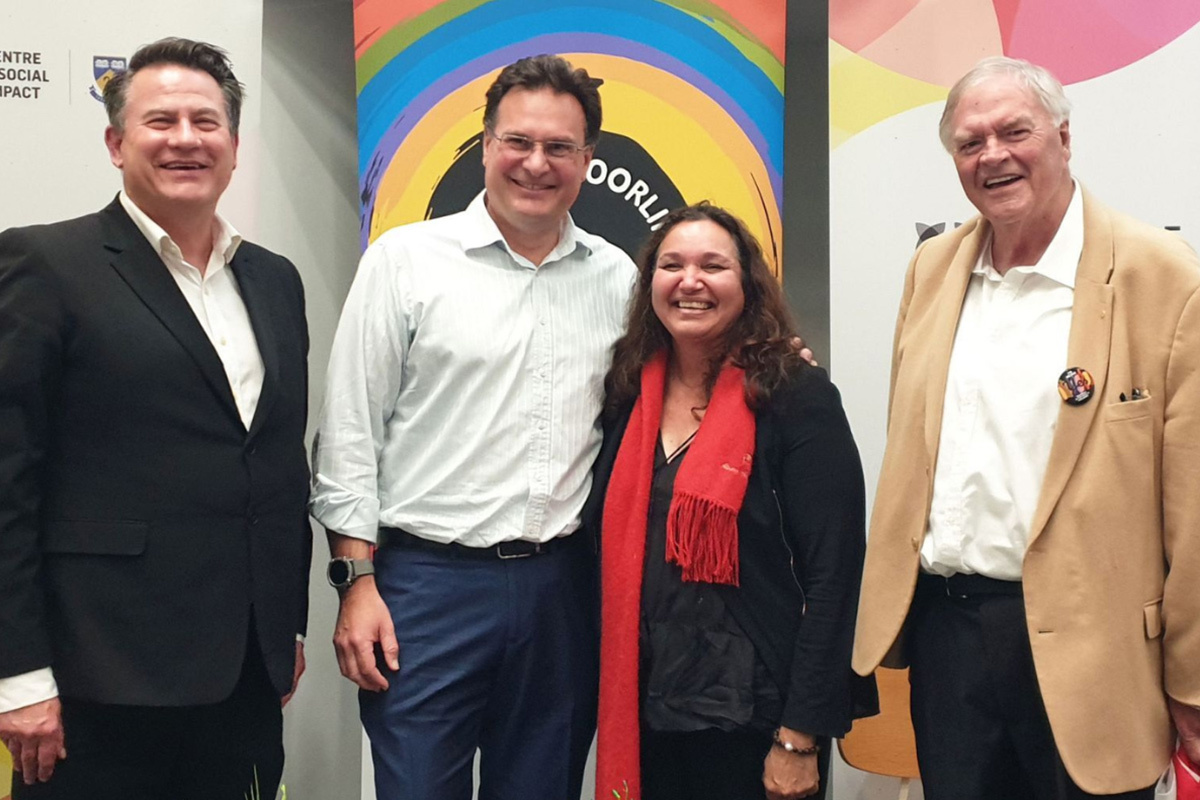Decoding the voice to parliament: Indigenous leaders share their reflections


In the lead up to the Voice referendum on October 14, the Centre for Social Impact at The University of Western Australia and Danjoo Koorliny were joined by Carol Innes AM and Glen Kelly OAM for a detailed discussion into what it means for Australia.
We were humbled to have over 50 people attend in-person, and over 200 join online, highlighting the significance of this moment in the nation's history. Dr Richard Walley OAM and Co-Director of Danjoo Koorliny gave the Welcome to Country. In the audience we were privileged to have Jim Morrison, original founding member of Reconciliation WA and the inaugural chair of the WA Stolen Generations Alliance, Kim Beazley AC, ex-leader of the Australian Labor Party and ex-governor for WA, and Aboriginal Elders, Clive Morrison and Gail Burrows.
Director of CSI UWA, Professor Paul Flatau said, “this referendum aims to ensure Indigenous voices are heard and respected, fostering a more inclusive and equitable society, and for the Australian public, understanding its purpose is vital.
We hope that by facilitating a discussion of this size, with key Indigenous leaders, the audience can gain new insights into what the referendum means, and what the potential impact is of their vote”.
Carol Innes AM set the tone of honesty and deep reflection with her opening remarks. She is a proud Noongar woman with connections to Woolman, Wadjuk, Ballardong and Wadani people, and is Co-Chair of Reconciliation WA and Co-Director of Danjoo Koorliny.
Danjoo Koorliny Walking Together is a large-scale, long-term systems change project designed and led by Aboriginal leaders to help us all walk together as Aboriginal and non-Aboriginal people towards 2029 (200 years of colonisation in Perth) and beyond, be it in Western Australia, Australia or globally. It is a platform for conversation and change.
“So as Danjoo Koorliny stands for bringing people together and walking together, reconciliation, bringing people together on a one-line movement of recognition, respect, opportunity and responsibility, I feel a bit heavy in heart. Heavy in heart, mind, body and spirit.
“When I think about this process, did I think that we were going to have to get down to one vote for us to be recognised as people who are deserved of respect and recognition in this country? One vote for the whole nation to make that decision for us…
“The journey of where we’re going in the next few weeks will be hard...and it’s hard on many of us right now…”
Glen Kelly OAM shared his reflections next. He is a proud Noongar man with over 25 years of experience in Aboriginal affairs, native title development, and Indigenous land management. He is a current member of the National Native Title Tribunal, a position that exists as part of the Native Title Act that came about from a yes vote at the 1967 referendum.
“It's turning into a very difficult time and process for Aboriginal people across the country, where permission for all of those really terrible arguments and misdirections about Aboriginal people has been given to be spoken,” Glen said.
What will Australians be asked on October 14?
Glen continued to explain the exact question that Australian’s will be asked on October 14:
A Proposed Law: to alter the Constitution to recognise the First Peoples of Australia by establishing an Aboriginal and Torres Strait Islander Voice. Do you approve this proposed alteration?
And, went on to detail the insertion of section 129 into the constitution, if the law passes:
- In recognition of Aboriginal and Torres Strait Islander peoples as the First Peoples, there shall be a body called the Aboriginal and Torres Strait Islander Voice.
- The Voice may make representations to Parliament and executive government on matters relating to Aboriginal and Torres Strait Islander peoples.
- The Parliament shall, subject to the Constitution, have power to make laws in respect to matters relating to the Voice, including its composition, its function and its powers.
Glen shared his insights before moving onto the Q&A section of the discussion.
“So from my point of view, the reason why there is justification of having a constitutionally enshrined voice is because it, at least in a very, very small way, enables us to participate in the social contract.
At the same time, I’m a believer in iterative change, so I still think it’s quite significant, very positive and could lead to many, many good things…”
What were the questions from the audience?
The audience was then invited to ask their questions. Listen below as Carol and Glenn answer:
- Can you comment on how Aboriginal people are opposing the voice and why?
- How do we counter the misinformed narrative that is at the moment telling us that this change will divide us as a nation?
- One of the other arguments is why should we have a special measure for a particular group of people?
- How significant do you think the no campaigns, if you don't know, vote no message will influence the result of the referendum?
- Can you shed a little bit of light about the post-referendum process? Assuming positively that there is a yes, what will that look like to nut out some of those details?
- What do you think will happen if the vote is no?
Professor Paul Flatau closed the session by saying “And I would end where I began, which is that these kinds of votes make a difference. We wouldn't have the 1993 Native Title Act without the vote in the 1967 referendum, and we need to think positively about the positive change that will result from this vote on October the 14th…”
“This is time for your head and hearts to connect, to make a difference, to be a part of the change.”
Thank you to everyone who was a part of this vital discussion.
